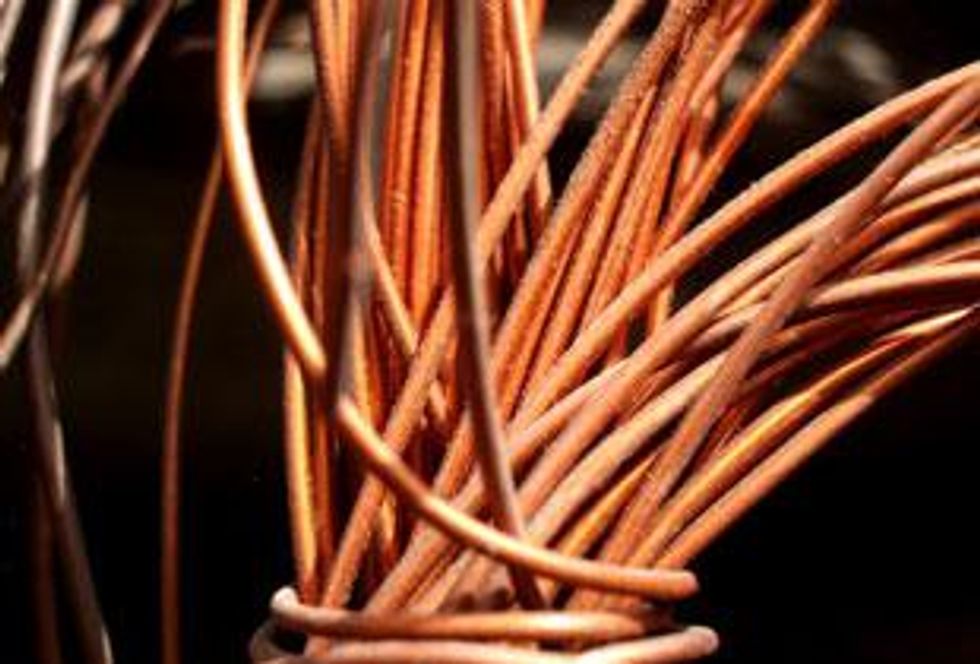Despite copper’s slide in price, the metal is holding ground compared to other commodities. Japan’s reconstruction efforts are apt to boost metal demand in the medium term.
By Leia Michele Toovey-Exclusive to Copper Investing News
Copper plummeted to a three-month low Tuesday, as anxiety over the safety of nuclear plants in quake-stricken Japan permeated the global markets.The natural disaster stoked fears that the global economic recovery would stall, prompting traders to cut their exposure to risky assets. Nearly $1 trillion worth of equities were sold off as traders abandoned high-risk assets such as commodities, and reallocated their funds into “safer” investments such as government bonds. Copper for three-month delivery on the London Metal Exchange dropped as much as 1.6 percent to $9,039 a metric tonne. Copper for June delivery on the Shanghai Futures Exchange dropped 1.2 percent to 68,600 Yuan
Despite copper’s slide in price, the metal is holding ground compared to other commodities. On the COMEX division of the New York Mercantile Exchange, the most actively traded contract, for May delivery, was recently down 1.5 percent, or 6.1 cents, at $4.1255 per pound. In comparison, April crude-oil futures were down 3.2 percent.
Copper prices are proving resilient in the face of the global sell-off as market participants expect Japan’s reconstruction efforts to boost metal demand in the medium term. Once the crisis recedes, Japan will need to rebuild. This process will require the purchase of a greater-than-expected volume of copper from a market already in tight supply. “Everything from the power grid, housing construction, autos to consumer appliances are going to be required, and all the base metals markets are going to benefit from the rebuilding effort,” said Max Layton, deputy head of commodities at Macquarie Securities Group.
According to Deutsche Bank (NYSE:DB), Japan’s copper consumption may drop by as much as 50,000 metric tonnes over three-months, however, this could then be offset by demand of three times this magnitude as reconstruction projects take off, Deutsche Bank added that copper and zinc are most likely to benefit from the reconstruction efforts.
Business activity in Japan, the world’s third-largest economy is at a near standstill. The Topix index completing its worst two-day plunge since 1987, as concern grew about the safety of nuclear plants damaged by the country’s worst earthquake on record. The index sank 9.5 percent to 766.73. The MSCI Asia Pacific Index fell as much as 7.5 percent to 121.69. Japanese Prime Minister Naoto Kan said today in a nationally-televised press conference that the risks of further radiation leaks are increasing after explosions at the plant in northern Japan. Emergency cooling systems failed following last week’s massive earthquake and tsunami, resulting in the explosions.
Number one copper producer, Chile, announced today that its copper exports are unlikely to suffer as a result of the earthquake. Due to the extremely tight global supplies of copper, shipment of the red metal to Japan can easily be rerouted to alternative markets. “Any copper that can’t be received in Japan will be redirected elsewhere,” a trader in Santiago said. “Another trader added that China would be a likely market for any copper as Chinese smelters are working with plenty of unused capacity.” The Escondida mine run by BHP Billiton (NYSE:BHP), FreePort-McMoRan‘s (NYSE:FCX) Candelaria mine and Antofagasta Minerals (LON:ANTO) are Japan’s top suppliers of copper concentrate. In January, Japan imported close to a third of Chile’s copper concentrate exports, some 47,000 tonnes, along with a small amount of copper cathodes. Japan accounts for roughly five percent of world copper consumption. As of Tuesday, Japanese buyers have yet to declare force majeure on Chilean copper shipments.
Company news
Ivanhoe Mines (TSX:IVN) and BHP Billiton’s joint venture has discovered a zone of shallow copper-molybdenum–gold mineralization just 10 km’s north of the Ivanhoe Mines Oyu Tolgoi copper-gold mining complex, in southern Mongolia. The discovery, known as Ulaan Khud North, extends by an additional three kilometers to the north to more than 23 kilometers, half of which has been extensively drill-tested to date. Ivanhoe Mines executive chairman and chief executive officer Robert Friedland said the new discovery offers potential to discover new porphyry deposits, rich in copper and gold. BHP Billiton has 50 percent stake in the JV and has spent $8m in exploration costs and conducting an airborne survey using the proprietary Falcon(TM) gravity gradiometer system over the Oyu Tolgoi area.





